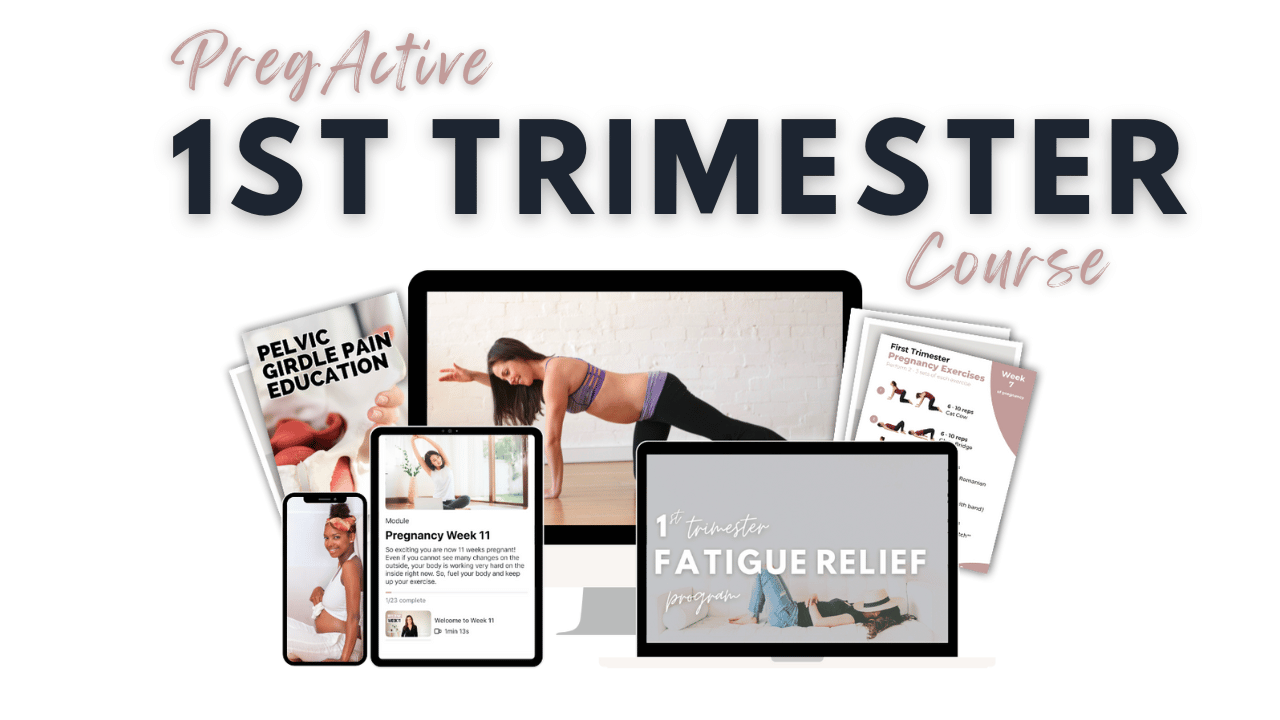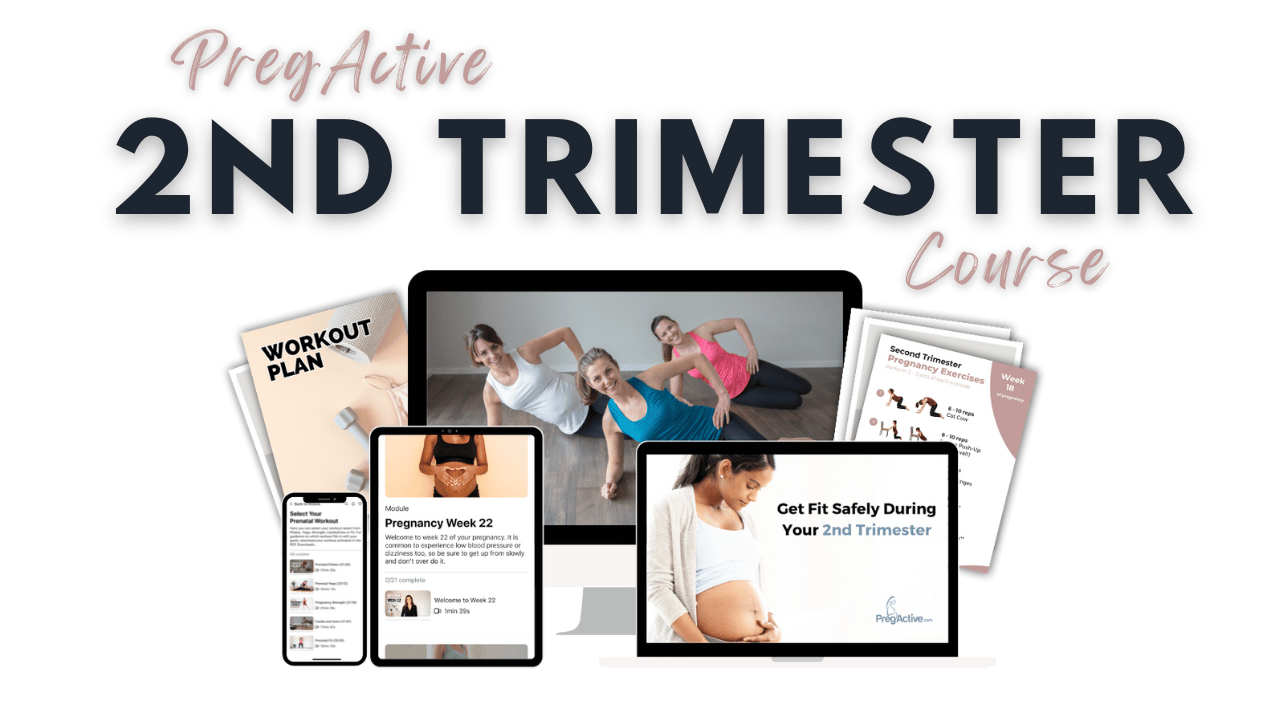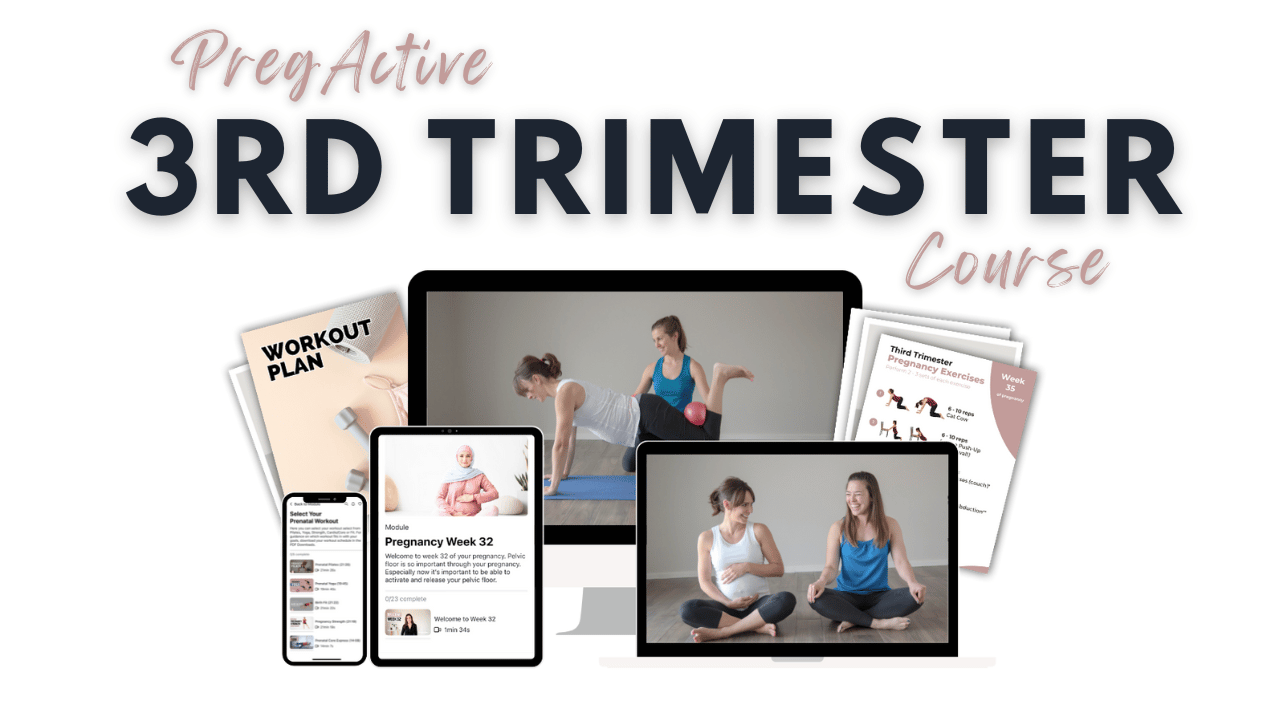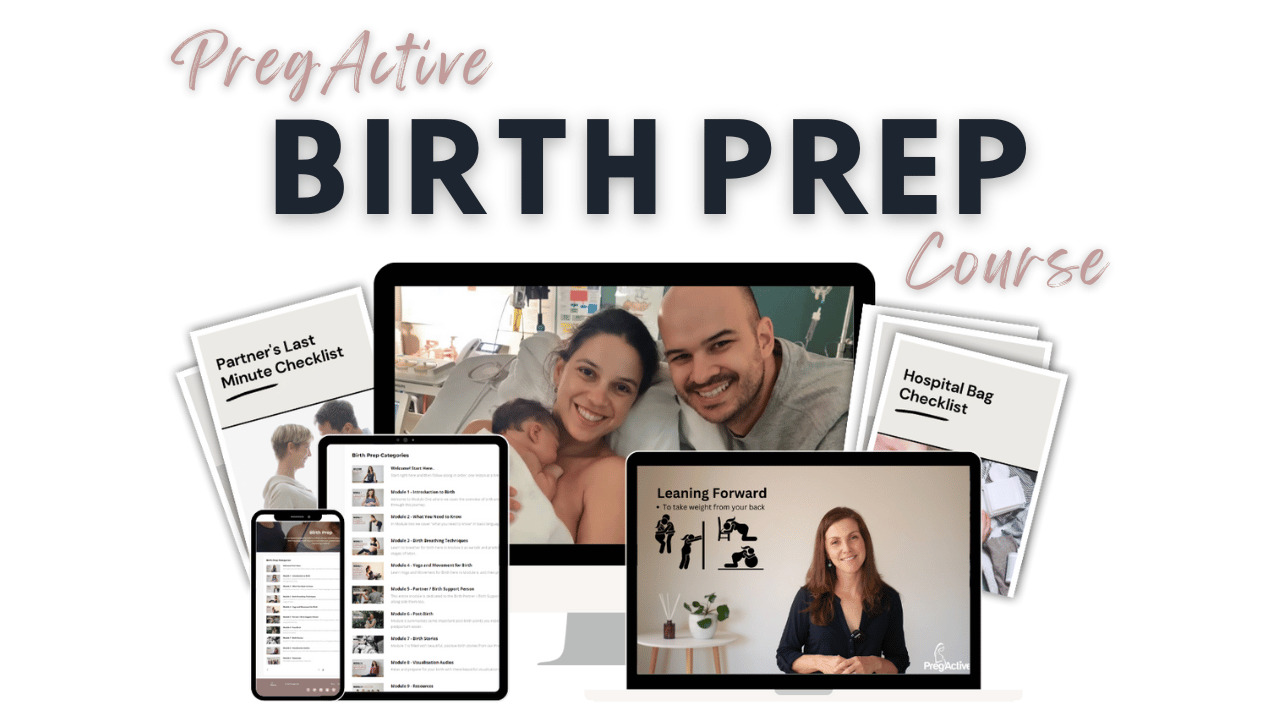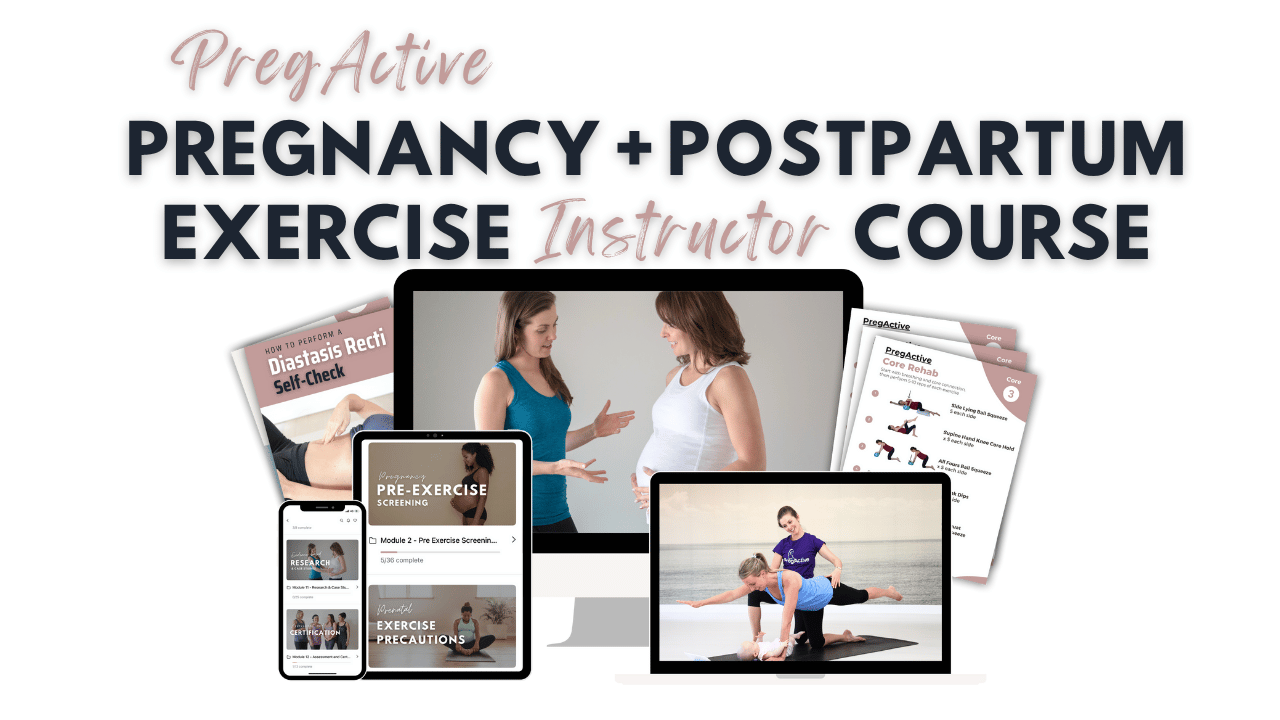Is Exercise Safe during Pregnancy?
Jul 12, 2023
Is Exercise Safe during Pregnancy?
No. While I am a strong advocate for exercising when pregnant; not all women can participate in physical activity due to a medical condition. What every pregnant mama needs to do before starting a prenatal fitness program is to get medical clearance from their doctor.
Are you wondering if it's safe to exercise during pregnancy?
In this informative post, I will dive deep into the benefits and guidelines of physical activity for pregnant women. Discover how regular exercise can promote a healthier pregnancy, alleviate common discomforts, and even prepare your body for labor.
I'll cover the types of exercises that are safe, any precautions to consider, and expert tips to help you stay active while ensuring the well-being of both you and your baby.
I tackle the important question: "Is Physical Activity Safe For All Pregnant Women?" Many expectant mothers wonder about the safety of exercising during pregnancy, and we provide valuable information and expert advice to help you make informed decisions about staying active while expecting.
From the benefits of physical activity to the precautions to take, I cover it all in my comprehensive online prenatal health and fitness program.
Are you wondering if physical activity is safe for all pregnant women?
The answer is that while exercising during pregnancy is beneficial; not all women are approved by their treating health professional to exercise. Some prenatal health issues may result in your doctor recommending you don't exercise.
If you are approved to exercise then you will find that it can help reduce pregnancy back pain, improve mood, and even help with labor and delivery. But it's important to consult with your healthcare provider before starting any exercise routine.
Medical Conditions
Certain medical conditions or complications may require modifications or restrictions. Listen to your body and make sure to stay hydrated and avoid overheating.
Activities like walking, swimming, and prenatal yoga are generally safe options.
Remember, every pregnancy is different, so what works for one woman may not work for another. So, if you're unsure about whether a certain activity is safe for you, always check with your doctor first.
Is Physical Activity Safe For All Pregnant Women?
If you are attending in-studio prenatal exercise classes please be sure to keep your instructor informed of any changes to your health. A qualified and experienced prenatal instructor will be able to advise you on what you can and cannot do.
Got Back Pain?
Suffering from a sore back in your pregnancy? This is for you! A prenatal specific full body workout that is designed to help with posture and back care. Safe for any trimester.
In this pregnancy workout video, you will learn exercises specifically designed to help relieve back pain during pregnancy. Maintaining a strong and healthy back is crucial for expecting mothers as their bodies go through significant changes.
Get 200+ FREE Pregnancy Workouts >
When Is Exercise Not Safe?
There are a wide range of medical or health conditions that may prevent you from working out when pregnant. Here are just a few of those.
1. Being pregnant with twins, triplets or multiples along with other risk factors for preterm labor. Again, this will be dependent with each individual.
Most of the time you will be able to exercise but with a highly modified program. Your should avoid high-impact movements and only include recommended prenatal exercises.
2. Other reasons are preterm labor, bleeding from the vagina, or if your water breaks. Preterm labor happens before 37 weeks of pregnancy. Bleeding from the vagina and having your water break may be signs of preterm labor.
3. Cervical insufficiency or a cerclage. Cervical insufficiency means your cervix (small canal that connects your uterus and vagina) dilates too early during pregnancy, usually without pain or contractions. Cervical insufficiency can cause premature birth and miscarriage.
4. Gestational hypertension or preeclampsia. Gestational hypertension is high blood pressure during pregnancy. It starts after 20 weeks of pregnancy and goes away after you give birth.
5. Placenta previa after 26 weeks of pregnancy. This is when the placenta lies very low in the uterus. Placenta previa can cause heavy bleeding and other complications later in pregnancy.
6. Severe anemia or certain heart or lung conditions. Anemia is a problem of not having enough healthy red blood cells or hemoglobin to carry oxygen to the body's tissues.
Exercise during Pregnancy
Exercise during pregnancy is a topic that's really important to me, and I'm guessing to many of you as well. Not only does it have a significant impact on a woman's overall health, but it also plays a crucial role in the health and development of her baby.
Will Exercise Hurt My Baby?
When it comes to exercise during pregnancy, many women have concerns and misconceptions that hold them back from staying active.
One common worry is that exercise might put their baby at risk, or that it'll lead to complications during pregnancy or childbirth.
Others might think that exercising will cause them to gain too much weight, or that it'll be too strenuous and uncomfortable. Some women might even believe that exercising during pregnancy will increase their risk of miscarriage or preterm labor.
These concerns are understandable.
But they're often based on misconceptions or outdated information. In reality, exercising during pregnancy can be incredibly beneficial for both mom and baby, as long as it's done safely and under the guidance of a healthcare professional.
Of course, it's essential to listen to your body and adjust your exercise routine as needed, but with the right approach, you can enjoy a healthy and active pregnancy.
Should You Avoid Physical Activity?
Another myth that needs to be busted is that all pregnant women need to take it easy and avoid physical activity altogether.
While it's true that some women may need to modify their exercise routine or take regular breaks, many can continue to exercise safely and effectively, even up until the third trimester.
Let's talk about the different types of exercises that are safe for pregnant women. Low-impact activities like walking when pregnant, swimming, and prenatal yoga are usually great options, as they're gentle on the joints and can help improve flexibility and strength.
Pelvic Floor
It's also important to incorporate pelvic floor exercises when pregnant that target your core and pelvic floor muscles, as these can help with posture, balance, and even reducing the risk of incontinence after childbirth.
Of course, every pregnancy is unique, and what works for one woman might not work for another. That's why it's crucial to consult with your healthcare provider before starting or continuing any exercise routine during pregnancy.
They can help you create a personalized plan that takes into account your health, fitness level, and any pregnancy-related challenges you might be facing.
The Benefits of Exercise
Recent studies have shown that exercising during pregnancy can have some amazing benefits, not just for mom, but for baby as well.
For example, research has found that regular exercise during pregnancy can reduce the risk of gestational diabetes, improve fetal development, and even lead to a healthier birth weight.
Exercise has also been shown to reduce symptoms of anxiety and depression, which are common during pregnancy.
Safe Exercise Tips for Pregnant Women
I chat about these safety precautions to my mamas in my in-studio prenatal classes and I also make sure our online members are aware to. So, here are the main safety precautions that you should keep in mind during exercise.
Yes, there are many more but here some some main points to get you started.
During pregnancy, it's crucial to prioritize the safety and well-being of both you and your baby.
Incorporating exercise into your routine can have numerous benefits, but it's important to do so with caution. In my online course,
I cover topics such as the types of exercises that are safe for pregnant women, the importance of staying hydrated and listening to your body, as well as when to avoid certain activities.
Remember, always consult with your healthcare provider before starting any exercise routine during pregnancy. Your health and safety should be the top priority.
First and foremost, always consult with your healthcare provider before starting any new exercise routine.
Choose low-impact exercises that are gentle on your body, such as walking, swimming, or prenatal yoga.
Avoid activities that involve jumping, sudden changes in direction, or the risk of falling. Stay hydrated and make sure to take frequent breaks to prevent overheating.
Listen to your body and stop immediately if you feel any pain, dizziness, or shortness of breath. Wear comfortable, supportive clothing and footwear to reduce the risk of injury.
Pelvic floor exercises can help strengthen your muscles and prepare you for labor. Lastly, remember to breathe deeply and avoid holding your breath during exercise.
By following these safety tips, you can stay active and healthy throughout your pregnancy.
Safety Precautions
1. This first one is really important. I want you to buy a sports bra designed for pregnant women that gives you a lot of support to help protect your breasts.
2. Stay well-hydrated by drinking plenty of water before, during, and after your workout. Just so you know, here are the signs of dehydration: racing heart, dizziness, and urinating only small amounts or having urine that is dark yellow.
3. It is vital you avoid becoming overheated, especially in the first trimester. Exercise in a cool room and avoid exercising outside when it is very hot.
4. Avoid lying flat on your back when pregnant because when you lie on your back, your uterus presses on a large vein that returns blood to the heart. This position may cause your blood pressure to decrease for a short time.
5. Listen to your body. There are some important reasons why you should stop exercising when pregnant. baby's health and your health is a priority so accept that there are times when you need to rest.
In summary, exercising during pregnancy can be an incredibly empowering and beneficial experience, as long as it's done safely and under the guidance of a healthcare professional.
By staying active, you can improve your overall health, reduce the risk of complications, and even have a healthier baby.
So, don't be afraid to get moving, and remember to always prioritize your body and your baby's well-being.


